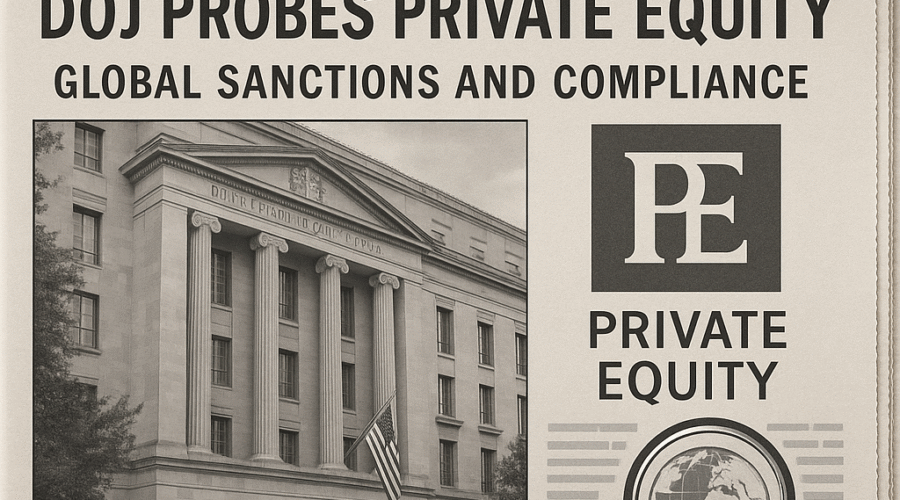The Department of Justice’s unprecedented declination to prosecute private equity firm White Deer Management LLC following its voluntary disclosure of sanctions violations at portfolio company Unicat Catalyst Technologies establishes a critical precedent for M&A risk mitigation. This resolution—the first application of DOJ’s M&A Safe Harbor Policy—demonstrates how rigorous post-acquisition compliance protocols and immediate self-disclosure can shield acquirers from successor liability despite severe underlying violations. The case signals DOJ’s commitment to incentivizing corporate transparency while maintaining aggressive enforcement against sanctions evasion, with Unicat paying $5.8 million in penalties and its former CEO facing criminal conviction[1][3][6][8].
💼 Seasoned CorpDev / M&A / PE expertise
Case Background: Uncovering Inherited Violations
White Deer Management acquired Texas-based Unicat Catalyst Technologies in September 2020, relying on seller representations of compliance with U.S. sanctions laws. The COVID-19 pandemic delayed operational integration until June 2021, when Unicat’s new CEO discovered a pending transaction with an Iranian customer during his first site visit to the company’s Alvin headquarters. This red flag triggered an internal investigation that uncovered systematic sanctions violations spanning 2014-2021, including 23 illegal sales of chemical catalysts to Iran, Venezuela, Syria, and Cuba generating $3.33 million in revenue. The scheme involved falsified export documents, concealed customer identities, and tariff evasion on Chinese imports totaling $1.66 million[1][3][11][14].
Evidence revealed that Unicat’s co-founder and former CEO Mani Erfan orchestrated the violations, directing employees to falsify records and providing false compliance warranties during due diligence. Despite junior counsel reviewing sales agent agreements with Iranian entities pre-acquisition, the misconduct remained undetected due to document volume and pandemic-related due diligence constraints. The violations directly supported state-owned entities in sanctioned jurisdictions, including Venezuela’s oil infrastructure and Iran’s petrochemical sector, contravening the International Emergency Economic Powers Act and Export Control Reform Act[9][12][14].
The DOJ’s M&A Safe Harbor Policy: A New Enforcement Framework
Revised in March 2024, the NSD Enforcement Policy’s M&A Safe Harbor provision creates a presumption of declination for acquirers who: (1) lawfully complete bona fide acquisitions; (2) voluntarily self-discover misconduct; (3) disclose violations to DOJ within six months of closing (with flexibility for reasonable delays); (4) fully cooperate; and (5) implement timely remediation. This policy aims to incentivize post-acquisition compliance integration by offering acquirers protection from successor liability when uncovering historical misconduct[6][8][10].
The policy represents a strategic shift toward cooperative enforcement, acknowledging that M&A transactions inevitably transfer compliance liabilities. By requiring “exceptional and proactive cooperation”—including disclosure of foreign-located records, identification of personal device evidence, and facilitation of individual prosecutions—the framework balances corporate accountability with national security priorities. Crucially, the safe harbor applies even when pre-acquisition due diligence fails to detect violations, provided disclosure occurs before government investigation[4][6][13].
White Deer’s Textbook Response: Disclosure, Cooperation, Remediation
Within one month of discovering the Iranian transaction, White Deer voluntarily disclosed potential criminal conduct to DOJ’s National Security Division—before completing its internal investigation—establishing timeliness despite occurring 10 months post-closing. DOJ accepted this delay due to pandemic integration disruptions, missed due diligence evidence, and immediate harm mitigation through transaction cancellation. The firm’s “exceptional cooperation” included comprehensive document production spanning foreign records and employee devices, factual presentations identifying culpable individuals, and witness interview facilitation[4][8][13].
White Deer’s remediation exceeded DOJ expectations: termination of involved employees within six months, comprehensive compliance program implementation including third-party contract revisions, dedicated trade compliance managers, and mandatory sanctions training. The firm further absorbed Unicat’s $3.8 million DOJ forfeiture, $3.88 million OFAC penalty (credited against forfeiture), $391,183 BIS penalty, and $1.66 million CBP tariff restitution, demonstrating financial accountability without criminal prosecution[4][8][12][15].
Resolution Architecture: Declination, Penalties, and Individual Accountability
DOJ’s June 16, 2025 declination letter formally absolved White Deer and affiliates of criminal liability under the safe harbor policy, while Unicat entered a non-prosecution agreement requiring forfeiture of $3.33 million in illicit proceeds. Parallel resolutions saw Unicat pay $3.88 million to OFAC (with $3.33 million credited from forfeiture), $391,183 to BIS for export violations, and $1.66 million to CBP for tariff evasion. Former CEO Mani Erfan pleaded guilty to conspiracy charges under IEEPA and anti-money laundering statutes, accepting a $1.6 million personal judgment alongside potential imprisonment[1][8][12][15].
This multi-agency resolution—coordinated between DOJ, OFAC, BIS, and Homeland Security—exemplifies heightened interdepartmental collaboration on sanctions enforcement. The structure intentionally shields acquirers acting in good faith while imposing escalating consequences: acquired entity financial penalties, individual criminal liability for executives, and corporate monitor requirements. OFAC’s penalty calculation notably incorporated aggravating factors including senior management complicity and harm to national security interests, offset by Unicat’s post-acquisition remediation[8][12][15].
Strategic Implications for Private Equity Compliance Protocols
This landmark case establishes a five-pillar framework for private equity compliance in regulated acquisitions: (1) enhanced pre-acquisition due diligence incorporating sanctions-specific document review protocols and specialized counsel; (2) strengthened representations & warranties with clawback provisions for compliance breaches; (3) rapid post-closing integration audits targeting high-risk transactions; (4) immediate investigation and disclosure timelines upon violation discovery; and (5) comprehensive remediation including personnel actions, control redesign, and training[1][3][9].
For fund managers, the resolution underscores non-negotiable post-acquisition steps: appointing interim compliance officers during integration, implementing transaction monitoring systems within 90 days, and establishing board-level compliance reporting. Crucially, DOJ’s acceptance of White Deer’s 10-month disclosure—beyond the 180-day policy benchmark—signals flexibility when acquirers demonstrate documented diligence constraints and prompt post-discovery action[4][10][13].
Broader Enforcement Trends: Sanctions as National Security Priority
The Unicat resolution occurs amid unprecedented sanctions enforcement resources, with FY2025 seeing 37% increased DOJ NSD funding and new cross-border investigation units. Recent Tri-Seal Compliance Notes (March 2023-July 2023) explicitly warn foreign companies and private equity firms of extraterritorial jurisdiction, particularly for semiconductor, aerospace, and energy sector transactions. Enforcement data reveals 63% year-over-year increase in IEEPA corporate penalties, reflecting Biden administration priorities[2][7][12].
Simultaneously, DOJ’s Corporate Enforcement Policy revisions guarantee declinations for voluntary disclosures absent aggravating factors—a framework now successfully stress-tested in M&A contexts. This creates strategic tension for acquirers: while safe harbor protections expand, failure to disclose discovered violations risks catastrophic liability under the “knowing violations” doctrine established in United States v. Halkbank. The Unicat case thus represents both shield and sword in DOJ’s enforcement arsenal[6][8][10].
Conclusion: The New M&A Compliance Calculus
White Deer’s declination establishes voluntary self-disclosure as the cornerstone of acquisition risk management, validating DOJ’s safe harbor as a functional incentive structure. For private equity, the case mandates: specialized sanctions due diligence beyond routine compliance checks; contractual safeguards allocating liability for pre-acquisition violations; and immediate post-close compliance integration teams. The $5.8 million penalty outcome for Unicat—versus White Deer’s zero liability—creates an unambiguous economic argument for transparency[1][4][8].
As global sanctions regimes expand, this precedent offers acquirers a replicable blueprint: upon violation discovery, immediately (1) suspend implicated activities; (2) launch internal investigations with external counsel; (3) disclose preliminary findings to DOJ within 30 days; and (4) implement personnel actions and control enhancements. Firms adopting this protocol transform regulatory risk from liability into demonstrable compliance commitment—a critical advantage in an era of intensified national security enforcement[3][10][15].
Sources
https://www.winston.com/en/blogs-and-podcasts/global-trade-and-foreign-policy-insights/doj-declines-prosecution-of-pe-firm-lessons-for-international-trade-violations-and-beyond, https://www.hunton.com/insights/legal/ofac-bis-and-doj-guidance-for-foreign-companies-to-comply-with-us-sanctions-and-export-control-laws, https://www.clearytradewatch.com/2025/06/doj-national-security-division-issues-first-declination-under-merger-related-safe-harbor-provisions/, https://www.vnf.com/department-of-justice-declines-to-prosecute-private-equity-firm-under-ma-safe-harbor-policy, https://www.squirepattonboggs.com/-/media/files/insights/publications/2020/01/department-of-justice-revises-policy-on-self-disclosure-of-export-control-and-sanctions-violations/36887giwcexport-controls-and-sanctions-enforcement-policy-client-alert.pdf?rev=056aec6f1e554a6fa5e23ec32966e9c9&hash=93297EB8500821C9C32D524B53F65E96, https://www.mofo.com/resources/insights/250624-doj-issues-first-ever-declination, https://www.justice.gov/nsd/export-control-and-sanctions, https://www.whitecase.com/insight-alert/doj-declines-prosecute-private-equity-firm-after-post-acquisition-voluntary-self, https://natlawreview.com/article/department-justice-declines-prosecute-private-equity-firm-under-ma-safe-harbor, https://www.subjecttoinquiry.com/2025/06/justice-department-issues-first-declination-under-nsds-ma-safe-harbor-policy-to-private-equity-firm/, https://vinciworks.com/blog/how-white-deer-dodged-prosecution-the-high-stakes-value-of-self-reporting-sanctions-breaches-2/, https://www.akingump.com/en/insights/alerts/acquirors-beware-pe-firm-escapes-doj-prosecution-but-acquired-entity-hit-with-dollar2-million-in-penalties, https://www.justice.gov/opa/media/1403771/dl?inline, https://www.justice.gov/opa/media/1403781/dl?inline, https://stankielaw.com/2025/06/unicats-3-88m-sanctions-settlement-the-importance-of-voluntary-self-disclosures-under-the-dojs-ma-policy/





